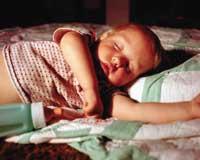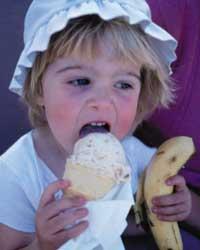Childhood obesity
What the child has seen has been learned by a Basque proverb. And in food we have much more adults, and if we are still more parents, to teach children. In childhood, nutritional habits or habits, the way of eating, are reinforced and supplemented. If at this stage of life the child eats a lot of high-energy food, for example, as he grows up he will continue to consume and will maintain or even increase excess weight.
Currently more obese

In recent years the number of obese children has increased dramatically, and according to some studies, obesity affects 10% of the Spanish child population. In view of this terrifying data, we are immediately asked whether the education and "culture" of food and nutrition that we are transmitting to our children is adequate. According to Jaume Serra, a specialist in nutrition, "adults project our own nutritional errors in our sons and daughters, and although they have more and more information to complete their criteria, children and young people remain the last responsible for their food." Keep in mind that children will usually end up copying what they have seen their parents and adults do.
Points to consider
- Today children have at their disposal a wide variety of products and foods of high caloric content. Children love burgers, sausages, pizzas, ice cream or sweets. When leaving school we will often see with all kinds of buns or buns, foods rich in fats and fats, instead of a sandwich made with some bread and sausage (chorizo, ham, etc. ).
- But in addition to feeding, there are other factors that can contribute to obesity in children. One of them is ACTIVITY OR POOR PHYSICAL EXERCISE. Now that they are video games, they are computer games or television, they have the opportunity to “live” without getting out of the couch the games they previously did live. Do not forget the risk of falling into sedentary lifestyle. A last-minute study shows that children spend less calories than when they are asleep watching a TV show. Add to this that there are children who eat all kinds of snacks while in front of the screen (chips, chocolates, popcorn,...)
We have seen why a child becomes obese. And what consequences can obesity have for the child? Nothing good, because obesity has many negative and negative aspects for the life of the child.
Childhood obesity inconvenience
- 1. Higher obese possibilities. The chances of obesity in adults are also very high, especially if this excess weight occurs during puberty.
- 2. Higher risk of developing certain diseases If obesity continues, or even increases in adulthood, the risk of cardiovascular disease and diabetes is very high, in addition to the high cholesterol that can already contribute from childhood.
- 3. Dangerous overload The musculoskeletal system of the obese child suffers a significant overload due mainly to the weight of the child. And its effect is deformities (on the knees) or greater propensity to have flat feet.
- 4º Abnormal growth Some obese children are at the same time very high and will arrive early to puberts, so they stop growing before others and in adulthood are usually lower than average.
- 5. Psychological problems These excessive kilos of obese children often suffer a huge suffering or calvary. Often these children feel marginalized by their friends or peers, who often make hard mocks. This situation leads the child to isolate himself from others, to seek his protection in food, which closes the vicious circle. Another danger is that in their childhood they may be afraid to fatten children or adolescents who have leftover kilitos, which can cause anorexia nervosa if there is any predisposition for it.
How to treat these children?

In the case of obese children, treatment is not pharmacological, unless there is another disease associated with obesity. The solution to the problem is to teach better and healthier eating and living habits to both the child and his parents and caregivers. Establish a food measure, if necessary, but very careful and controlling all the details so that obesity or overweight do not progress, of course, but without restrictions that can affect the growth of the child. Therefore, at these ages it may be more appropriate to increase energy expenditure (via sport) than to prescribe a strict diet.
"The best way to treat obesity," says the expert in Endocrinology and Pediatrics at the Valle Hebón Hospital in Barcelona, Antonio Carrascola, "is to anticipate the problem from the first months of life. If the mother realizes that, after checking the weight and size of her child, she has begun to deviate from the standard measures, then it is advisable to consult with the pediatrician so that he gives the appropriate guidelines and eating criteria. It is always easier and faster to correct one kilo overweight than ten kilograms."
How to feed an obese child?
- In no case force to eat everything that is on the plate. This is one of the biggest mistakes that can be made.
- If possible, avoid eating between meals. And if you're used to that give it an apple or a carrot if not.
- Reduces consumption of processed products and pastries or sweets. Instead, hang cereals ...better whole grains, or whole grains with little sugar.
- Get used to eating fruits, vegetables and legumes.
- Add fish consumption while reducing meat and poultry (chicken, turkey, etc. ).
- The obese child has to do sports or exercise, better if supervised by a subject expert. With sport you will lose weight without realizing it and the diet will not have to be as strict (with all the psychological consequences that this can lead).
Buletina
Bidali zure helbide elektronikoa eta jaso asteroko buletina zure sarrera-ontzian











